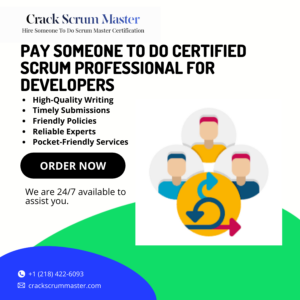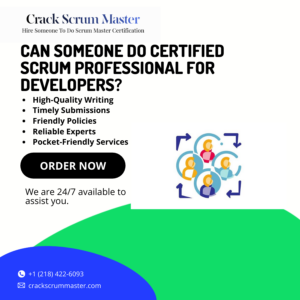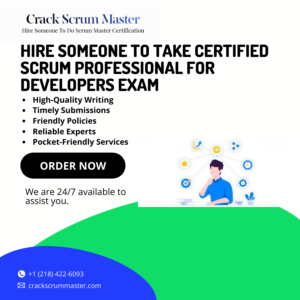Need Help?
We are here to help.
Feel free to contact us for your scrum master certification.
Software developers frequently consider Certified Scrum Master (CSM) certification an invaluable asset to their professional credentials, helping them distinguish themselves when applying for jobs or submitting resumes for promotions, while giving them confidence in their ability to lead agile teams successfully.
The Certified Scrum Master program (CSM) consists of classes taught by educators recognized by Scrum Alliance. All participants must successfully pass a stringent evaluation administered by an approved educator.
Certification can provide a significant edge in an increasingly competitive job market. Not only can it increase your odds of being selected for interviews, but it will also strengthen your understanding of Agile methodology and principles, enabling more efficient Agile project management implementation.
For this certification, a two-day course and the Certified Scrum Master exam must be taken and passed within 90 days after enrolling; you will have two opportunities at passing. However, each additional attempt requires additional fees.
A-CSM certifications are ideal for people who already hold CSM credentials and work within an Agile team, as it specializes in advanced scrum mastery and lean agile frameworks – especially beneficial to teams working remotely. Furthermore, their validity period lasts two years and must be renewed by earning 20 Scrum Education Units (SEUs).
Exams aren’t easy and require plenty of study. To make the best use of your time, plan your study sessions accordingly to avoid overloading yourself and taking frequent breaks can help maintain focus while decreasing stress levels. Be mindful of time limits when answering each question and consider looking back over past exams papers to get familiar with its format.
The Certified Scrum Professional for Developers certification from Scrum Alliance is an in-depth, two-day program to teach and assess product development skills within Agile environments. Participants must pass an exam supervised by an educator to demonstrate their knowledge of Agile principles. Once certified, this certification lasts two years before renewing annually by earning Scrum Education Units (SEU), which may include attending training programs or meetings with other Scrum professionals. Being Certified increases both credibility and professional connections within your field.
Scrum offers many capabilities that can benefit project managers, product owners, and development teams alike. It can improve communication and collaboration while increasing productivity and reducing costs – something it can do across many industries such as software development, electronics production, healthcare provisioning etc.
To become a Certified Scrum Master (CSM), it’s necessary to attend and pass an online training course led by a Certified Scrum Trainer or CST, taking and passing their exam of 35 multiple-choice questions up to two times; additionally, CSTs offer two year membership to Scrum Alliance.

CSM certification may not guarantee you employment, but it can make your resume stand out among applicants and increase the competitive salary that entry-level Scrum Masters typically command – typically around $50K-80k annually for entry level positions, rising up to over PS120K with experience and certification! Some companies even request candidates be certified Scrum Master before being considered.
Exam writing practice helps students develop an understanding of the different questions asked during exams and how best to respond in terms of effectiveness and relevance. Furthermore, exam writing practice also allows them to improve their writing abilities and avoid common marks-losing mistakes such as missing the point or failing to use evidence-based arguments in their responses. Furthermore, students should implement time management strategies, seek feedback from others on performance gaps they might need improvement on, as well as identify areas for growth where improvements could be made.
Scrum Master certification provides team leaders with the skills needed to work more effectively together, remain focused and coordinated, identify potential issues early, resolve them before they escalate, as well as develop and manage product backlogs, schedule projects accordingly, manage risks and dependencies effectively and manage risks and dependencies more effectively. Many employers recognize and value such certifications; others prefer experience over certification; nevertheless it is beneficial in advanceing career.
Participants of this course will gain knowledge on using Scrum principles and practices with cross-functional teams of developers, testers, designers and other roles. Furthermore, they will develop a deep understanding of Agile engineering practices to apply in their specific environments.

Though certification doesn’t guarantee employment, it does show your dedication to software development. Furthermore, working on teams that create quality and reliable products makes certification even more attractive as it proves your ability to manage projects and address complex problems effectively.
Your CSD(tm) certification can be achieved by attending an approved Scrum Alliance educator-designed course and successfully passing its assessment (which may consist of an exam or other form of evaluation determined by your educator).
Attendance in an Applying Professional Scrum for Developers class isn’t mandatory, but highly encouraged. The course can help you understand Agile engineering practices and DevOps tools used in building working software projects as well as using Scrum framework to manage complexity and create product value. Additionally, if unable to attend class you can request an extension for PSD assessment by submitting a Student Guidance Form.
Scrum certifications have become an increasingly popular commodity, yet those pursuing them without understanding its underlying concepts often end up making poor choices. CSD training provides participants with all of the tools and knowledge necessary for succeeding within a Scrum development team – it is designed with developers in mind but could benefit architects, analysts, programmers, database developers, testers as well.
To become certified as a CSD, you must attend the Applying Professional Scrum for Software Development class and receive a password to take the PSD I assessment. Your certification lasts two years; renewal can be earned by earning Scrum Education Units (SEUs). These may include attending events sponsored by Scrum Alliance or Scrum Alliance events as well as giving presentations about Scrum, reading in-depth Scrum books or watching Scrum videos and providing non-compensated professional services related to Scrum – such as volunteering within Scrum communities or user groups!
Self-Assessment Exam Doing Service (SAEDS) offers an online-based examination that mimics the exact format and specifications of actual exams in terms of content outline coverage, percentage of items per area, cognitive complexity and analysis reports that can guide study preparation efforts. Available only once for each product purchased and accessible only through the Internet.
Self Assessments can be an invaluable asset when preparing for interviews or competitive exams, as well as throughout life. Employees can utilize self assessments in the workplace to understand their strengths and weaknesses more clearly – this enables them to become more productive members of their teams by improving performance.
At times, self-assessments can be beneficial in both improving assignments and engaging students more fully in evaluation processes. By providing clear criteria for evaluation purposes, more likely will students engage in rigorous processes of evaluation.
Many may view certifications as unnecessary; however, having CSD certification on your resume makes an impressive statement about your knowledge and understanding of Scrum as well as demonstrating agile skills relevant to today’s job market.
This three-day course engages participants as teams on an actual project. Utilizing modern engineering practices and Scrum, students develop increments of potentially releaseable functionality over the course of an iteration – providing participants with experience of all aspects of development such as requirements engineering, design, coding, testing, and integration.
To earn this certification, you must pass an assessment administered by a Scrum Alliance-accredited CSD educator, which typically involves both classroom-based exams and pre- and post-course work as determined by the educator. Furthermore, to keep your status active for another two years you must earn Scrum Education Units (SEUs) through earning Scrum Education Units and renewing your certification every year.
The Certified Scrum Developer (CSD) course is tailored for software developers working within agile teams. It teaches them how to construct products using Agile technical practices while helping them avoid common errors.

Participants of this course will acquire the tools needed to facilitate better dialogue among product owners, Scrum teams, customers, and stakeholders; additionally they will learn how to promote agile and lean practices within their organization.
Hired exam doers provide numerous advantages, including time savings, access to subject expertise, reduced stress levels and enhanced performance. Furthermore, professional exam doers adhere to high levels of integrity while offering confidentiality guarantees and adopt strict privacy protocols so as to keep both personal information and exam results safe from compromise.
The Certified Scrum Developer (CSD) course is a two-day training designed to equip software developers/programmers with the skills needed to produce high quality products in an Agile fashion. Students learn all of the crucial tools and techniques required for becoming effective members of a Scrum team.
This hands-on technical practices course covers topics such as advanced TDD, code and product smells, continuous integration and continuous deployment (CI/CD), as well as managing technical debt. Participants should possess at least one year of programming experience and be acquainted with Object Oriented Design (OOD). Attendees are strongly advised to bring their own laptop equipped with their preferred programming language for class; an examination will be proctored via remote online classroom and require reliable internet connectivity.
This Scrum Alliance-accredited course teaches developers advanced tools and techniques that will assist in the iterative and incremental approach required of Scrum teams. The training includes several hands-on programming labs in Java and C Sharp as well as Agile architecture principles, advanced TDD, code smells and continuous integration/continuous delivery (CI/CD). It’s the ideal training for any developer working on a Scrum team!
This two-day class immerses participants into an immersive Scrum environment as they create real software using various Scrum practices such as pairing, TDD, refactoring, trunk-based development and Emergent Design. Additionally, participants learn Agile engineering practices specifically tailored for software development such as Collective Code Stewardship and Refactoring for Maintainability. Students who successfully complete both portions are eligible to earn Certified Scrum Developer certification with Scrum Alliance that lasts up to two years.
Scrum certifications are an excellent way to demonstrate your knowledge of Agile concepts and practices, opening up more opportunities in your career with higher pay and leadership roles as well as showing that you are committed to implementing these ideas and principles. CSM, PSM and Scrum@Scale certifications are popular choices among these.
Scrum Master training teaches you to lead a team and create an environment conducive to its success, including how to resolve conflicts and promote open dialogue. Furthermore, this training can assist in creating a solid and cohesive unit ready to face any challenge head on.
Scrum Master classes provide another advantage of networking: meeting other practitioners and learning from them as you share experiences, both professional and personal. Such interactions may lead to new business opportunities or provide invaluable information about your company’s culture; furthermore, certified Scrum developers worldwide serve as an invaluable source of knowledge that will assist with reaching your goals more quickly.
Online exam preparation services provide an efficient and cost-effective solution for preparing for online exams. They assist students in finding suitable study materials and creating personalized pathways towards success, as well as helping to avoid distractions and ensure work can be submitted on time to Canvas without errors or delays. To maximize efficiency of these online services, students should save their work regularly so it will be readily accessible when time comes for submission.
Acquiring a Certified Scrum Master certification (CSM) can open up many career doors. Not only will you become more marketable and earn higher salaries than non-certified peers, but the CSM certificate will enable you to lead Agile teams more effectively while helping develop an Agile mindset that leads to fewer disagreements and successful projects as well as the skills to identify and remove any obstructions to team progress.
Feel free to contact us for your scrum master certification.

